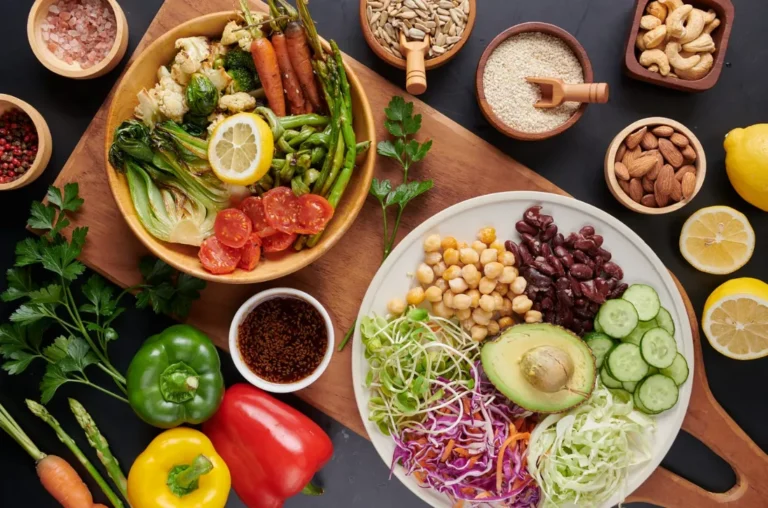Plant-based eating is not just a diet trend; it’s a lifestyle movement that has captured the hearts of millions worldwide. This green revolution is transforming how we eat, live, and interact with the planet. Whether you’re curious about the health benefits or want to make an environmentally conscious choice, embracing plant-based eating offers a pathway to a healthier, more sustainable future. Below, we explore unique and diverse aspects of plant-based eating, including its benefits, tips for getting started, and delicious recipes to inspire your journey.
- What is Plant-Based Eating? A Holistic Approach
Plant-based eating revolves around consuming foods derived primarily from plants—fruits, vegetables, legumes, nuts, seeds, and whole grains. While some interpret it as strictly vegan, others incorporate occasional animal products. The emphasis, however, remains on making plant-derived foods the core of every meal.
The beauty of plant-based eating is its flexibility. Unlike restrictive diets, this technique allows you to customize your meals to fit your interests and lifestyle, making it a viable option for everybody.
- Health Benefits of Plant-Based Eating
Adopting a plant-based diet has numerous, well-established health benefits. It can enhance your wellbeing in the following ways:
Improved Heart Health
Plant-based diets cut bad cholesterol and heart disease risk due to fiber, good fats, and antioxidants. Studies demonstrate that plant-based diets improve cardiovascular health.
Weight Management
Plant-based foods generally include less calories and more fiber, and this makes you feel full and helps you control your weight. You can enjoy larger portions of nutrient-rich meals without worrying about calorie overload.
Reduced Risk of Chronic Diseases
Plant-based diets reduce diabetes, hypertension, and cancer risk. Plants’ antioxidants, vitamins, and minerals fight inflammation and oxidative stress.
Better Digestive Health
With a higher intake of fiber from fruits, vegetables, and whole grains, plant-based diets support a healthy gut microbiome, preventing issues like constipation and promoting regularity.
- Environmental Impact: A Sustainable Choice
One of the most compelling reasons to join the green revolution is its positive impact on the planet. The environmental footprint of plant-based eating is significantly smaller than diets rich in animal products.
Reducing Greenhouse Gas Emissions
Animal agriculture contributes to over certain amount of global greenhouse gas emissions. By replacing meat and dairy with plant-based options, you actively reduce your carbon footprint.
Saving Water Resources
Producing plant-based foods requires far less water compared to animal products. For example, growing vegetables and legumes uses significantly less water than raising livestock.
Preserving Biodiversity
Shifting to plant-based eating helps reduce deforestation and habitat destruction, preserving biodiversity for future generations.
- Tips for Transitioning to Plant-Based Eating
Making the switch doesn’t have to be daunting. Here are practical tips to help you embrace a plant-based lifestyle:
Start Small
Begin with “meatless mondays” or replace one meal a day with a plant-based option. This gradual approach makes the transition easier.
Explore New Ingredients
Experiment with foods like tofu, tempeh, jackfruit, and nutritional yeast to add variety and flavor to your meals.
Known More About Balanced Nutrition
It’s essential to ensure you’re getting all the necessary nutrients. For example, focus on protein-rich plant foods like beans, lentils, and quinoa, and consider supplements for vitamin b12 or omega-3s if needed. Speak with nutritionists or reliable internet sites to learn more about establishing a balanced diet.
Experiment with Plant-Based Recipes
There are a lot of tasty and easy-to-follow recipes on the internet. There’s something for everyone, from hearty lentil soups to smooth cashew cheese.
- Busting Myths About Plant-Based Eating
Despite its benefits, plant-based eating often faces skepticism. Let’s debunk some common myths:
Myth: Plant-Based Diets Are Expensive
The truth is that plant-based foods like rice, beans, and veggies are usually less expensive than meat and dairy.
Myth: You Can’t Get Enough Protein
Protein-rich plant foods like tofu, tempeh, edamame, beans, and almonds supply all the necessary amino acids your body needs.
Myth: Plant-Based Eating Is Bland
Truth: With the right spices, herbs, and cooking techniques, plant-based meals can be as flavorful and satisfying as their meat-based counterparts.
- Delicious Recipes to Get You Started
Here are a few easy recipes to kickstart your plant-based journey:
Lentil and Vegetable Stir-Fry: This dish is easy to make, full of energy and fiber, and you can change it up by adding your favorite vegetables.
Chickpea and Spinach Curry: A flavorful and hearty curry that pairs perfectly with rice or flatbread, offering a comforting meal.
Avocado and Black Bean Tacos: These tacos are a hit for family dinners and perfect for those craving a filling, nutritious meal.
Banana Oat Pancakes: A simple breakfast option that’s vegan-friendly and full of energy-boosting ingredients.
- Join the Green Revolution Today
Green revolution is a call to action for a healthier you and world, not just a trend. You’re improving your health and the world by eating plant-based. Plant-based diet empowers, whether you’re starting off or deepening your commitment.
Explore trusted resources, join supportive communities, and get creative in the kitchen to understand how plant-based eating can change your life. One plate at a time, we can green the planet.
Plant-based diet is worth the effort, with advantages beyond the dinner table. Join the green revolution today to improve yourself!
